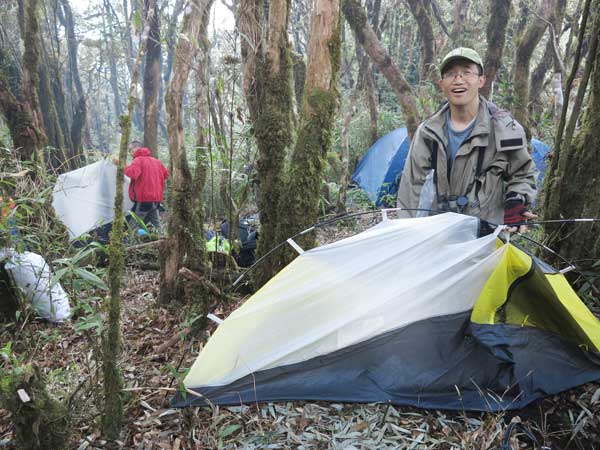Searching for a song
 |
|
Making camp in the woods and bamboo groves becomes a major challenge for many after a long trek. Photos by Chen Liang / China Daily |
When Chen Liang was offered a chance to trek through a beautiful stretch of forest to listen to the song of the endangered western black-crested gibbon, he jumped at the chance. Little did he know the trek would be a test for even the most hardened outdoorsman.
It was an offer too good to refuse.
"Participants will trek through the key habitats of western black-crested gibbons on the Ailao Mountains, or Ailaoshan, in Yunnan province," the invitation read. "Listen to their singing in the morning, observe the rich fauna and flora in the day and stargaze at night."
| Last of the gibbons |
A light trek through a beautiful area, albeit at elevations of up to 2,500 meters. How could a nature lover say no?
This is how I found myself in Kunming, capital of Yunnan, to attend a warm-up conference ahead of what I imagined was going to be a pleasant trek in beautiful surroundings. We learned basic information about the gibbons, including their limited distribution and endangered status and the motive and goals of our trip.
The trek was co-organized by Ailao Mountains National Nature Reserve's Xinping Bureau, Fauna and Flora International's China primates project and the Ecotourism Faculty of Southwest Forestry University. The nearly 50 participants included conservationists from various NGOs, biologists, a botanist, birdwatchers, ecotourism planners, outdoor tour leaders, reserve rangers and even college students selected from local universities' green groups, as well as media.
"We want to let more people know about the existence of the gibbons and get a glimpse of one of their last sanctuaries and its rich biodiversity," says Meng Bingbo, manager of FFI's China primates project.
"By raising awareness among the public, we hope to better protect the country's most populous gibbon strongholds on the Ailao Mountains."
Of the gibbons' global population of 1,100-1,400, about 1,000-1,300 gibbons live in China, of which about 700-800 live on the mountains' range.
The event was also a part of efforts to design hiking trails and related interpretation systems for eco-tourists on the mountains, says Ye Wen, dean of the Ecotourism Faculty of Southwest Forestry University. "We are thinking of turning the reserves on Ailao Mountains into a national park to protect the gibbons," he says.
After nearly two days in Kunming and a night in a county town of Xinping, we headed to Babaoshu, a village on Ailaoshan that would be the starting point of our trek.
Related:
Although few participants of the recent trek on the Ailao Mountains (Ailaoshan) managed to hear the western black-crested gibbons' duets, no one seemed to regret taking part. More...
For more Eco China, here


















